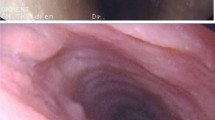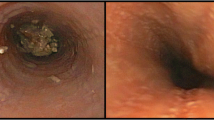Abstract
Eosinophilic oesophagitis is a chronic inflammatory syndrome that is the leading cause of paediatric dysphagia in Western countries. Diagnosis requires upper gastrointestinal endoscopy and biopsies. Treatment aims to reduce inflammation, alleviate symptoms and prevent long-term oesophageal fibrosis and strictures. First-line therapies in children include proton pump inhibitors, swallowed topical corticosteroids and elimination diets.

Similar content being viewed by others
References
Gonzales-Cervera J, Lucendo AJ. Eosinophilic esophagitis: an evidence-based approach to therapy. J Investig Allergol Clin Immunol. 2016;26(1):8–18.
Gutiérrez-Junquera C, Fernández-Fernández S, Luz Cilleruelo ML, et al. The role of proton pump inhibitors in the management of pediatric eosinophilic esophagitis. Front Pediatr. 2018;6:119.
Rossetti D, Isoldi S, Oliva S. Eosinophilic esophagitis: update on diagnosis and treatment in pediatric patients. Pediatr Drugs. 2020;22(4):343–56.
Lucendo AJ, Molina-Infante J, Arias A, et al. Guidelines on eosinophilic esophagitis: evidence-based statements and recommendations for diagnosis and management in children and adults. United Eur Gastroenterol J. 2017;5(3):335–58.
Hirano I, Chan ES, Rank MA, et al. AGA Institute and the Joint Task Force on Allergy-Immunology Practice Parameters Clinical Guidelines for the management of eosinophilic esophagitis. Gastroenterology. 2020;158(6):1776–86.
Lipka S, Kumar A, Richter JE. Impact of diagnostic delay and other risk factors on eosinophilic esophagitis phenotype and oesophageal diameter. J Clin Gastroenterol. 2016;50(2):134–40.
Shaheen NJ, Kim HP, Sperry SLW, et al. A phenotypic analysis shows that eosinophilic esophagitis is a progressive fibrostenotic disease. Gastrointest Endosc. 2014;79(4):577–85.
Dellon ES, Speck O, Woodward K, et al. Distribution and variability of esophageal eosinophilia in patients undergoing upper endoscopy. Mod Pathol. 2015;28(3):383–90.
Munoz-Osores E, Maldonado-Campos I, Olivares-Labbe MT, et al. Corticosteroids for eosinophilic esophagitis in children: a meta-analysis. Pediatrics. 2020;146(5):e20200874.
Liu D, Ahmet A, Ward L, et al. A practical guide to the monitoring and management of the complications of systemic corticosteroid therapy. Allergy Asthma Clin Immunol. 2013;9:30.
Liacouras CA, Furuta GT, Hirano I, et al. Eosinophilic esophagitis: updated consensus recommendations for children and adults. J Allergy Clin Immunol. 2011;128(1):3–20.
Lucendo AJ, Arias A, Molina-Infante J. Efficacy of proton pump inhibitor drugs for inducing clinical and histologic remission in patients with symptomatic esophageal eosinophilia: a systematic review and meta-analysis. Clin Gastroenterol Hepatol. 2016;4(1):13–22.
Gutierrez-Junquera C, Fernandez-Fernandez S, Cilleruelo ML, et al. High prevalence of response to proton-pump inhibitor treatment in children with esophageal eosinophilia. J Pediatr Gastroenterol Nutr. 2016;62(5):704–10.
Gómez Torrijos E, García-Rodríguez R, Castro-Jiménez A, et al. The efficacy of step-down therapy in adult patients with proton pump inhibitor responsive oesophageal eosinophilia. Aliment Pharmacol Ther. 2016;43(4):534–40.
Hirano I, Dellon ES, Hamilton JD, et al. Efficacy of dupilumab in a phase 2 randomized trial of adults with active eosinophilic esophagitis. Gastroenterology. 2019;158(1):111–22.
Hirano I, Collins MH, Assouline-Dayan Y, et al. RPC4046, a monoclonal antibody against IL13, reduces histologic and endoscopic activity in patients with eosinophilic esophagitis. Gastroenterology. 2019;156(3):592–603.
Lieberman JA, Zhang J, Whitworth J, et al. A randomized, double-blinded, placebo-controlled study of the use of viscous oral cromolyn sodium for the treatment of eosinophilic esophagitis. Ann Allergy Asthma Immunol. 2018;120(5):527–31.
Kelly KJ, Lazenby AJ, Rowe PC, et al. Eosinophilic esophagitis attributed to gastroesophageal reflux: improvement with an amino acid-based formula. Gastroenterology. 1995;109(5):1503–12.
Arias A, Gonzalez-Cervera J, Tenias JM, et al. Efficacy of dietary interventions for inducing histologic remission in patients with eosinophilic esophagitis: a systematic review and meta-analysis. Gastroenterology. 2014;146(7):1639–48.
Philpott H, Nandurkar S, Royce SG, et al. Allergy tests do not predict food triggers in adult patients with eosinophilic oesophagitis: a comprehensive prospective study using five modalities. Aliment Pharmacol Ther. 2016;44(3):223–33.
Hoofien A, Dias JA, Malamisura M, et al. Pediatric eosinophilic esophagitis: results of the European Retrospective Pediatric Eosinophilic Esophagitis Registry (RetroPEER). J Pediatr Gastroenterol Nutr. 2019;68(4):552–8.
Lucendo AJ, Arias A, Gonzalez-Cervera J, et al. Empiric 6-food elimination diet induced and maintained prolonged remission in patients with adult eosinophilic esophagitis: a prospective study on the food cause of the disease. J Allergy Clin Immunol. 2013;131(3):797–804.
Author information
Authors and Affiliations
Corresponding author
Ethics declarations
Funding
The preparation of this review was not supported by any external funding.
Authorship and conflict of interest
C. Fenton and C. Kang are contracted/salaried employees of Adis International Ltd/Springer Nature, and declare no relevant conflicts of interest. All authors contributed to the review and are responsible for the article content.
Ethics approval, consent to participate, consent for publication, availability of data and material, code availability
Not applicable.
Rights and permissions
About this article
Cite this article
Fenton, C., Kang, C. Eosinophilic oesophagitis in children responds well to corticosteroids, PPIs and diet. Drugs Ther Perspect 37, 236–241 (2021). https://doi.org/10.1007/s40267-021-00835-0
Accepted:
Published:
Issue Date:
DOI: https://doi.org/10.1007/s40267-021-00835-0




